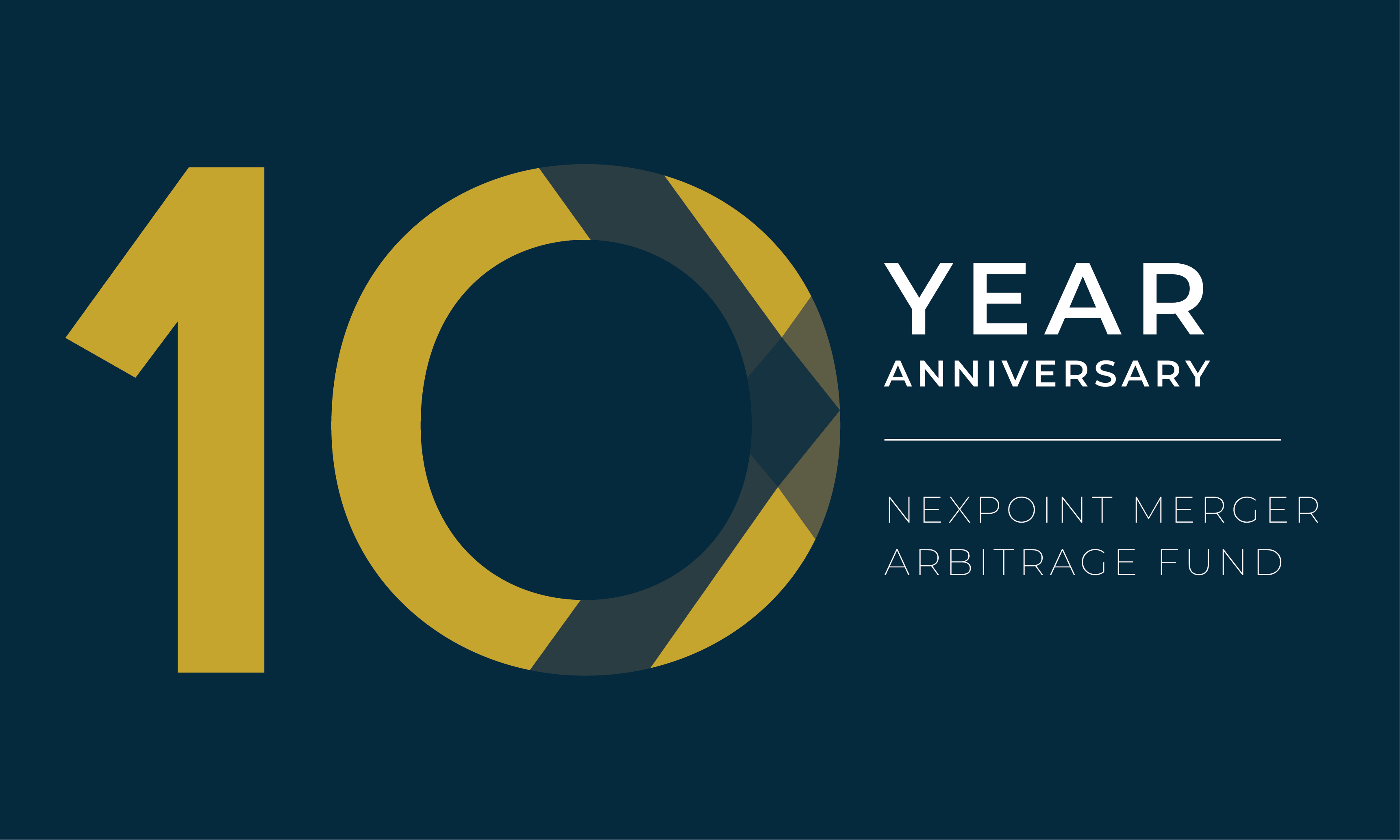FUNDS
NexPoint Credit Catalyst Fund
Overview
NexPoint Credit Catalyst Fund is an actively managed long/short absolute return mutual fund focused on investing in public and private credit special situations.
These events can include mergers, acquisitions, restructuring, refinancing, recapitalizations or economic events that can impact specific industries.
Class A
Ticker
NEDAX
INCEPTION
07/02/2025
Class C
Ticker
NEDCX
INCEPTION
07/02/2025
Class Z
Ticker
NEDZX
INCEPTION
07/02/2025
Strategy
The NexPoint Credit Catalyst Fund seeks to achieve its investment objective by primarily investing in fixed income securities of companies that the Adviser expects to benefit from an event catalyst.
Specific event catalysts include mergers & acquisitions, capital structure arbitrage, tender offers, asset sales or other divestitures, restructurings, spin-offs, refinancings, near-term debt maturities, asset monetizations, recapitalizations, or broader geopolitical or economic events that can impact specific industries.
Rationale
- Investment returns are driven by the outcome of dynamic, catalyst-focused corporate events rather than duration, credit quality, and/or the general direction of the broad fixed income market
- Flexible credit event strategy seeks to provide attractive risk-adjusted returns independent of credit market cycles and interest rates
- Heightened corporate activity potentially creates a target-rich landscape for an event driven strategy
Portfolio Managers

Scott Johnson is a Managing Director and Portfolio Manager at NexPoint Advisors, L.P. He has over 25 years of investment management experience with extensive experience in private equity, mergers and acquisitions and long / short hedge funds.

James Dondero is the founder of NexPoint. In addition to overseeing the group’s business and investment activities, Mr. Dondero serves as the portfolio manager of NexPoint Merger Arbitrage Fund, Event Driven Fund and Climate Tech Fund. He is also an officer and director at NexPoint’s publicly traded REITs.
Forms & Literature
Investor Forms
403(b) Forms
IRA FORMS
Non-Retirement Account Forms
College planning Forms
Press Releases
Contact Information
NexPoint Credit Catalyst Fund
NexPoint Credit Catalyst Fund
Investment Objective: The investment objective of NexPoint Credit Catalyst Fund (the “Credit Catalyst Fund” or the “Fund”) is to seek current income and capital appreciation.
Principal Investment Strategies: The Fund seeks to achieve its investment objective by investing, under normal circumstances, at least 80% of the value of its total assets (net assets plus the amount of any borrowings for investment purposes) in credit instruments. The Fund defines credit instruments broadly to include any debt instrument or instrument with debtlike characteristics. The Fund’s investments in credit instruments typically include corporate and sovereign bonds, senior loans, convertible securities and preferred stocks, and securitized instruments such as mortgage-backed securities (MBS), commercial mortgage-backed securities (CMBS), residential mortgage backed securities (RMBS), collateralized mortgage obligations (CMOs) and collateralized loan obligations (CLOs), which are vehicles backed by pools of assets such as mortgages, loans, or other receivables.
The adviser seeks to invest primarily in credit instruments that the Adviser expects to benefit from an event catalyst. Specific event catalysts include, but are not limited to: mergers, acquisitions, capital structure arbitrage (the exploitation of discrepancies of a company’s debt and equity securities), tender offers, asset sales or other divestitures, restructurings, spin-offs, initial public offerings, new issue debt, debt refinancings, near-term debt maturities, asset monetizations (the process of converting assets into a revenue source), recapitalizations (the restructuring of a company’s debt and equity structure), reorganizations, or broader geopolitical, environmental or economic events that can impact specific industries or the economy as a whole.
Catalyst driven investing also includes purchasing securities that may benefit from a company specific event such as, but not limited to, earnings, company investor days, product publications and other events which may be occurring in the industry the company operates in or in the broader economy.
The Fund may also invest in securities of late-stage distressed issuers and issuers involved in pre- and post-bankruptcy proceedings. The Fund may also purchase securities in anticipation of a company’s recovery or turnaround or the liquidation of all or some of the company’s assets. The success of any strategy employed by the Fund’s Adviser will largely depend upon, among other things, the Adviser’s skill in evaluating the likelihood of the successful completion of a particular catalyst or a related event.
In addition to the above strategies, the Fund may invest in other investments or utilize other strategies, including non-credit related event-driven and market neutral strategies. A market neutral strategy is a type of investment strategy that seeks to profit irrespective of whether prices of securities in the market more generally are broadly increasing or decreasing. The Fund may invest in securities of companies without an identified change or event to hedge unwanted exposures to an industry or the market as a whole.
The Fund may invest in foreign issuers and securities without limit. Non- U.S. securities may be denominated in either U.S. dollars or foreign currencies.
The Fund may invest in securities of issuers of any market capitalization. Also, the Fund may invest without limit in debt instruments of any duration, maturity or credit quality, including high yield debt (commonly referred to as “junk” bonds), distressed debt and defaulted debt.
The Fund may make investments that involve the use of investment leverage. The Fund may use derivative instruments of any kind, short sale positions and repurchase agreements to create investment exposure or leverage and the Fund’s total notional investment exposure may exceed its net assets significantly. The Fund may employ a variety of hedging strategies to seek to protect against issuer-related risk, including selling short the securities of the company that proposes to acquire the target company and/or the purchase and sale of put and call options.
The Fund may invest in indexed and inverse securities, such as other investment companies, including ETFs, closed-end funds and open-end mutual funds. Those investments may be made for the purpose of, among other things, gaining or hedging market exposure, hedging exposure to a particular industry, sector or component of an event-driven opportunity, or managing the Fund’s cash position. The Fund may hold a significant portion of its assets in cash, money market investments, money market funds or other similar short-term investments for defensive purposes.
The Fund’s holdings may be adjusted at any time. The Fund may also loan portfolio securities to earn income.
The Fund is a non-diversified fund as defined in the 1940 Act, which means that it may invest in a smaller number of issuers than a diversified fund and may invest more of its assets in the securities of a single issuer.
The Fund may engage in active and frequent trading of portfolio securities to achieve its primary investment strategies. The Adviser expects that the Fund’s active or frequent trading of portfolio securities will result in a portfolio turnover rate in excess of 100% on an annual basis.
RISK CONSIDERATIONS: When you sell Fund shares, they may be worth less than what you paid for them. Consequently, you can lose money by investing in the Fund. No assurance can be given that the Fund will achieve its investment objective, and investment results may vary substantially over time and from period to period. An investment in the Fund is not appropriate for all investors.
An investment in the Fund is not a deposit of any bank and is not insured or guaranteed by the Federal Deposit Insurance Corporation (FDIC) or any other government agency. Each risk summarized below is a principal risk of investing in the Fund and different risks may be more significant at different times depending upon market conditions or other factors.
Debt Securities Risk is the risk associated with the fact that the value of debt securities typically changes in response to various factors, including, by way of example, market-related factors (such as changes in interest rates or changes in the risk appetite of investors generally) and changes in the actual or perceived ability of the issuer (or of issuers generally) to meet its (or their) obligations. Debt instruments are subject to the risk of non-payment of scheduled interest and/or principal. Credit Risk is the risk that the issuers of certain securities or the counterparties of a derivatives contract or repurchase contract might be unable or unwilling (or perceived as being unable or unwilling) to make interest and/or principal payments when due, or to otherwise honor its obligations. Debt securities are subject to the risk of non-payment of scheduled interest and/or principal. Non-payment would result in a reduction of income to the Fund, a reduction in the value of the obligation experiencing non-payment and a potential decrease in the net asset value (“NAV”) of the Fund. Fixed Income Market Risk is the risk that fixed income markets may, in response to governmental intervention, economic or market developments (including potentially a reduction in the number of broker dealers willing to engage in market-making activity), or other factors, experience periods of increased volatility and reduced liquidity. During those periods, the Fund may experience increased levels of shareholder redemptions, and may have to sell securities at times when it would otherwise not do so, and at unfavorable prices. Fixed income securities may be difficult to value during such periods. Interest Rate Risk is the risk that fixed income securities will decline in value because of changes in interest rates. When interest rates decline, the value of fixed rate securities already held by the Fund can be expected to rise. Conversely, when interest rates rise, the value of existing fixed rate portfolio securities can be expected to decline. A fund with a longer average portfolio duration will be more sensitive to changes in interest rates than a fund with a shorter average portfolio duration. Prepayment Risk is the risk that during periods of falling interest rates, issuers of debt securities may repay higher rate securities may repay higher rate securities before their maturity dates. This may cause the Fund to lose potential price appreciation and to be forced to reinvest the unanticipated proceeds at lower interest rates. This may adversely affect the NAV of the Fund’s shares. Senior Loan Risk. The Fund’s investments in senior loans are typically below investment grade and are considered speculative because of the credit risk of their issuers. As with any debt instrument, senior loans are generally subject to the risk of price declines and to increases in interest rates, particularly long-term rates. Senior loans are also subject to the risk that, as interest rates rise, the cost of borrowing increases, which may increase the risk of default. In addition, the interest rates of floating rate loans typically only adjust to changes in short-term interest rates; long-term interest rates can vary dramatically from short-term interest rates. Although senior loans in which the Fund will invest will often be secured by collateral, there can be no assurance that liquidation of such collateral would satisfy the borrower’s obligation in the event of a default or that such collateral could be readily liquidated. High Yield Debt Securities Risk is the risk that below investment grade securities or unrated securities of similar credit quality (commonly known as “high yield securities” or “junk securities”) are more likely to default than higher rated securities. The Fund’s ability to invest in high-yield debt securities generally subjects the Fund to greater risk than securities with higher ratings. Such securities are regarded by the rating organizations as predominantly speculative with respect to capacity to pay interest and repay principal in accordance with the terms of the obligation. The market value of these securities is generally more sensitive to corporate developments and economic conditions and can be volatile. Market conditions can diminish liquidity and make accurate valuations difficult to obtain. Distressed Securities Risk is the risk that refers to the uncertainty of repayment of defaulted securities and obligations of distressed issuers. Because the issuer of such securities is likely to be in a distressed financial condition, repayment of distressed or defaulted securities (including insolvent issuers or issuers in payment or covenant default, in workout or restructuring or in bankruptcy or insolvency proceedings) is subject to significant uncertainties. Insolvency laws and practices in foreign jurisdictions are different than those in the U.S. and the effect of these laws and practices may be less favorable and predictable than in the U.S. investments in defaulted securities and obligations of distresses issuers are considered highly speculative. Derivatives Risk. Derivatives, such as futures and options, are subject to the risk that changes in the value of a derivative may not correlate perfectly with the underlying asset, rate or index. Derivatives also expose the Fund to the credit risk of the derivative counterparty. Derivative contracts may expire worthless, and the use of derivatives may result in losses to the Fund. Non-U.S. Securities Risk. Investments in securities of non-U.S. issuers involve certain risks not involved in domestic investments (for example, expropriation or political or economic instability). Short Sales Risk. The risk of short sales theoretically involves unlimited loss potential since the market price of securities sold short may continuously increase. Merger Arbitrage and Event-Driven Risk is the risk that the Adviser’s evaluation of the outcome of a proposed event, whether it be a merger, reorganization, regulatory issue or other event, will prove incorrect and that the Fund’s return on the investment will be negative. Even if the Adviser’s judgment regarding the likelihood of a specific outcome proves correct, the expected event may be delayed or completed on terms other than those originally proposed, which may cause the Fund to lose money. The Fund’s expected gain on an individual arbitrage investment is normally considerably smaller than the possible loss should the transaction be unexpectedly terminated.
Please see prospectus for a complete list of Investment Strategies and Principal Risks.
SALES CHARGES: Class A Max Sales Charge: 5.50%. Class C Contingent Deferred Sales Charge (“CDSC”) is 1% within the first year from each purchase.
NexPoint Credit Catalyst Fees and Expenses: Gross: Class A: 2.63%; Class C: 3.28%; Class Z: 2.28%. Net: Class A: 1.75%; Class C: 2.40%; Class Z: 1.40%.
The Adviser has contractually agreed to limit the total annual operating expenses (exclusive of fees paid by the Fund pursuant to its distribution plan under Rule 12b-1 under the Investment Company Act of 1940, as amended (the “1940 Act”), taxes, dividend expenses on short sales, interest payments, brokerage commissions and other transaction costs, acquired fund fees and expenses, and extraordinary expenses (collectively, the “Excluded Expenses”)) of the Fund to 1.30% of average daily net assets attributable to any class of the Fund (the “Expense Cap”). The Expense Cap will continue through at least July 2, 2026, and may not be terminated prior to this date without the action or consent of the Fund’s Board of Trustees. Under the expense limitation agreement, the Adviser may recoup waived and/or reimbursed amounts with respect to the Fund within thirty-six months of the date such amounts were waived or reimbursed, provided the Fund’s total annual operating expenses, including such recoupment, do not exceed the Expense Cap in effect at the time of such waiver/reimbursement.
Before investing in the Fund, you should carefully consider the Fund’s investment objectives, risks, charges and expense. For a copy of a prospectus or summary prospectus, which contains this and other information, please visit our website at nexpoint.com or call 1-877-665-1287. Please read the fund prospectus carefully before investing.






